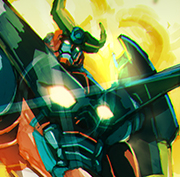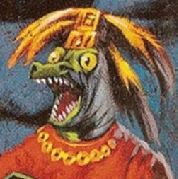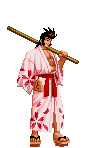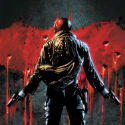|
ProfessorCirno posted:It's the same statement really. Nobody who hated 4e ever talks about rogues or rangers or clerics or...well, quite frankly, anything but fighters and wizards. Maybe the occasional Warlord hate from time to time, but by and large it's all down to fighters and wizards. Dude, you can't downplay the warlord hate--"shouting hands back on" and all that poo poo. I bet that if they reskinned the PHB1 warlord into a bard, they'd have dodged a great deal of the dumb ire directed at 4E's entire HP and healing system.
|
|
|
|

|
| # ? May 31, 2024 05:05 |
|
Yeah, I would say the Warlord is by far the most contentious of 4E's elements for the "verisimilitude True D&D" set, a purely martial character that directly fulfills a role and capabilities that, in prior editions, had been the sole province of spellcasters and allowed you to make a successful and effective all-martial party straight out of the core rulebook while completely ignoring magical characters. That's not to say that the 4E Fighter didn't get a ton of hate as well but the Warlord is basically 4E in a nutshell and it is the least surprising thing in the world that Mike Mearls enjoys making GBS threads all over it.
|
|
|
|
Yeah, note that the warlord is the only exception to their "all races and classes from previous PHBs will be in 5E's PHB" promise.
|
|
|
|
It's also the only 4E class that was excluded from receiving an Essentials makeover for some reason.
|
|
|
|
Yeah, in retrospect, I'm really undersellling the warlord hate. I think the warlord hate IS tied to the fighter hate, though. As I said, more or less nobody whinges about the 4e rogue, or barbarian, or warlock, or druid, or bard. It's all WIZARDS vs FIGHTER/WARLORD.
|
|
|
|
Well the reason for that is fairly obvious. Rogues and Rangers and such got the usual 4E criticisms of being "all about combat," which is simultaneously both a valid criticism while missing the forest for the trees given that 90% of any given D&D campaign is going to involve fighting monsters, but those classes largely just did what martial classes were expected to, namely swing weapons and deal damage. Yeah, they had "weeabo fightan magic" but it was still primarily just attacking and rolling damage and for martial classes that's fine. People can even accept primal magic raging Barbarians because there are like a half dozen Barbarian prestige classes in Pathfinder that do poo poo like that so whatever. The Fighter and Warlord broke that mold with marking and non-magical hitpoint recovery respectively, though. When people talk about martial classes getting "nice stuff," that's the sort of thing they're talking about, not just bigger damage numbers of more sword swings per round, but being able to restore hitpoints mid-battle or effectively lock down monsters is stepping on what True D&D sorts consider spellcaster-exclusive territory. And 4E was unrepentant about this for years...rather than roll it back they gave the Fighter and Warlord even more crazy stuff to do, like Brawler builds that let you grapple-slam monsters from level 1 or all sorts of new Warlord options. It wasn't until Essentials came along that you finally saw them start walking this back with boring beatstick Fighters and no Warlords whatsoever.
|
|
|
|
I remember early on that the Rogue's Bloody Path power was frequently cited as airtight, slam dunk proof that 4e was a WoWBabbyMMO.
|
|
|
|
Solid Jake posted:I remember early on that the Rogue's Bloody Path power was frequently cited as airtight, slam dunk proof that 4e was a WoWBabbyMMO. Everything about 4E was proof of that if you were bound and determined enough to hate it in that particular fashion but man oh man, Fighters "drawing aggro" was, if not the most cited example of 4E's MMOness, up there with class roles for the title.
|
|
|
|
Even the AWED system was criticised for being literally WoW, because "your powers have different cooldowns and you are just clicking on them, see? Yeah, I know a 3e Barbarian can rage only once per encounter, why do you ask?  " "
|
|
|
|
Solid Jake posted:I remember early on that the Rogue's Bloody Path power was frequently cited as airtight, slam dunk proof that 4e was a WoWBabbyMMO. Bloody Path was usually quoted by lovely DMs as proof that 4e was bad because "Uh, my monsters would never hurt themselves, heh, maybe your baby DMs let you get away with too much?"
|
|
|
|
Littlefinger posted:Even the AWED system was criticised for being literally WoW, because I had people telling me not only this, but that the power cards were literally a hotbar where you just clicked on things when their cooldown came up. I asked what happens then if they don't cut the powers out into cards, which was met with vague eyebrow movement and "Uh, well..."
|
|
|
Kai Tave posted:Yeah, I would say the Warlord is by far the most contentious of 4E's elements for the "verisimilitude True D&D" set, a purely martial character that directly fulfills a role and capabilities that, in prior editions, had been the sole province of spellcasters and allowed you to make a successful and effective all-martial party straight out of the core rulebook while completely ignoring magical characters. That's not to say that the 4E Fighter didn't get a ton of hate as well but the Warlord is basically 4E in a nutshell and it is the least surprising thing in the world that Mike Mearls enjoys making GBS threads all over it. Isn't the Martial/Spell-Caster distinction kind of weird though since these classes represent abstract things that don't actually exist? Like, if they took the Warlord and re-named it Bard 2 right out of the box and just added "song" after each Warlord power would it change the class of warlord at all or how it is played? Would it be adding to Spell-Caster power if its mechanically the same thing as it was before? Isn't the whole distinction kind of arbitrary and ultimately meaningless?
|
|
|
|
|
Bob Quixote posted:Isn't the Martial/Spell-Caster distinction kind of weird though since these classes represent abstract things that don't actually exist? Well, you can't really make something into a spell and then claim that it's still mechanically the same as before. Spells don't work in antimagic fields, can't be cast while wearing un-proficient armor, and there's weird interactions when multiclassing with other spellcasting classes.
|
|
|
|
Bob Quixote posted:Isn't the Martial/Spell-Caster distinction kind of weird though since these classes represent abstract things that don't actually exist? Having hitpoints be equally restorable by either A). magic or B). a non-magical rousing shout of encouragement makes a statement about hitpoints and the lens through which they're viewed. Similarly, gating hitpoint recovery behind "you must be this magical to do this" also makes a statement. If you strip all context out of D&D then yeah, it all ultimately just boils down to numbers and equations doing math at each other until one side is reduced to zero. But the context that a game designer assigns to this stuff can and does have an impact on how the game plays out and the direction people run with stuff. The entire crux of the whole "hitpoints must be physical injury" argument is that in prior editions of D&D the only way you could regain them short of going back to town and sleeping it off was to have an explicitly magical character use Cure Wounds on you (or maybe eat magical druid berries or something). You can point to that essay of Gygax's about how hitpoints are actually some sort of injury/luck/fatigue amalgam but that's not how the game treated them and so that's not how players and GMs treated them because how the game treats something like that is going to inform what people take away from it, i.e. hitpoints work this way because, well, there isn't any other way they work, so. 4E changed the ways hitpoints worked. You could regain them with magic, or you could have the restored by someone inspiring enough, or you could even regain them yourself with five minutes to catch your breath and rub some dirt on it. That paints a very different picture of what hitpoints "mean" than a game where the only way to regain them is to be bedridden or have a wizard fix it for you. The idea that spellcasters should be better than anyone who isn't a spellcaster is the ultimate culmination of how the distinction between these things in a game can inform attitudes and approaches, because for years and years D&D relegated tons and tons of stuff to the realm of magic and wizards and such, and so a whole bunch of people, players, GMs, and even game designers themselves, wound up accepting this as the "right" way to do things.
|
|
|
|
Bob Quixote posted:Isn't the Martial/Spell-Caster distinction kind of weird though since these classes represent abstract things that don't actually exist? Yeah, see, "refluffing" also took a lot of hate in 4e. There's a reason 5e literally opens with open masturbation of spellcasters, gushing about how great and important they are. People aren't paying attention to the mechanics - they want the game to fellate the class they identify with.
|
|
|
|
The page that went on and on about how spellcasters are literally mandatory to have in a party depressed me so much, because I really dislike spellcasters in D&D. Practically every other RPG I've ever played makes playing as a spellcaster both more fun, more balanced and actually feel more magical. Playing a D&D spellcaster is loving drudgery, particularly in 5th ed where the spell list is crap. You have a literal spellbook that's boring as gently caress to parse and have to spend all of your turns going "ummmm yeah I guess this turn I'll use Marvin's Magical Mud Bomb because gently caress it it's the best choice here" right up until you run out of spells and then you're not even a character anymore. I mean gently caress's sake, who enjoys this? I love spellcasters and I detest D&D's magic system.
|
|
|
|
Kai Tave posted:4E changed the ways hitpoints worked. 4e was the first time hitpoints worked right, but after thirty years of DMs narrating lost HP exclusively as blood and meat loss it was probably too much of a jump.
|
|
|
|
moths posted:4e was the first time hitpoints worked right, but after thirty years of DMs narrating lost HP exclusively as blood and meat loss it was probably too much of a jump. 4E made hitponts work more along the lines of that essay/explanation of Gygax's, but as often as that's cited there's a marked difference between "this is how I, Gary Gygax, envision hitpoints to be" and "this is how they actually work in the game I made." All the good intentions and headcanon in the world don't matter when the only way you give players the ability to make their HP bars go up is at the business end of a Cleric or a wand of Cure Light Wounds. Ironically if it weren't for Clerical healing magic then Gygax's intention for hitpoints would come through better, because as many people have noted over the decades getting hit and losing hitpoints doesn't really hurt you...there's no blood loss, no limbs flying, no pain or shock, and you can perform just as well at 1 hitpoint as you can at 100, so there's really nothing in the back-and-forth of "swing sword, hitpoints decrease" that goes against the notion that hitpoints are an abstract grab-bag of various factors condensed into a single value. But then you throw "Cure X Wounds" spells into the mix and welp, there you go, hitpoints are wounds, says so right on the tin, and since only Clerics get to restore hitpoints clearly restoring them must require magic, QED.
|
|
|
|
So my wife got me the 5e monster manual for Christmas. I may never use it, but drat this book is gorgeous. The art is amazing. Also, I wonder how many folks realize how much like the 4e Monster Vault it is, structurally.
|
|
|
|
OneThousandMonkeys posted:4E still takes too long to resolve combat even when you are using post-errata monsters. It takes way too long if you are fighting insubstantial enemies, enemies that throw off conditions, and/or enemies that lob stuns/dominates around (virtually everything after about level 16). Coming back to this, I've been doing some thinking. 4e had Encounter powers and Short Rests, so that you would enter each fight with basically the same resources at your disposal. This is good, as it makes encounters a lot easier to balance for the DM; you can build an encounter within the budget and throw it at the party any time within the adventuring day and it just works. 5e completely breaks with this "cooldown" setup; you basically have some classes using Dailies and others using at-wills, with short rests taking too long for their benefits to really be of much use (as has been pointed out by forums-poster kingcom and others; if you can take a short rest, you can probably talk an extended rest.) Tying this all together, if Daily powers are the gating mechanism for the harshest status effects (which the quoted post is basically pointing out as being stupid and ruining the game), could you design a game without Encounter powers or Daily powers, (balancing the at-will stuff accordingly) and still get the same utility that 4e had on the DM side?
|
|
|
|
Bob Quixote posted:Isn't the Martial/Spell-Caster distinction kind of weird though since these classes represent abstract things that don't actually exist? Grogs who like to hate on 4E (and other editions or whole other games) for having martial classes that can do ~amazing~ things say that casters can do these things because they have access to magic, which is capable of anything and everything, whereas martial classes do not, and therefore they have to abide by the rules of physics. They conveniently ignore the fact that Gygax himself wrote* that martials should be able to shrug dragon breaths and whatever because gently caress you, it's a fantasy game, that's why. 3rd Edition even has a specific classification for these things: "Extraordinary Abilities" to represent abilities that are beyond normal human capacity, but are not powered by magic. Now, in the event that you ever do get through to them, the next part of the argument is that giving martial classes a bunch of "powers" to allow them to compete on the same level as casters is just going to make everyone play the same. * Yet another layer of the problem is that D&D was written in a time where communicating ideas related to game design wasn't anywhere near as ubiquitous as it is now, and so D&D was "transmitted" really bad (when it wasn't being deliberately ignored). There was a certain level of abstraction built into the game because of its wargaming roots that was slowly thrown out over time in favor of more and more simulationism that didn't really fit. To quote myself from another forum: quote:You know what? You're absolutely right - an axe shouldn't reduce HP more than a dagger will.
|
|
|
|
P.d0t posted:See, this is the problem I have with 4e. Some classes have to use their customization "options" in a very narrow way just to keep up, while others get to use them for expanding the breadth of their capabilities. In short, I don't see this as a feature. Edit: And now for some actual content. Had a look at the Legend D20 Readthrough someone posted. While my initial read through of Legend was very positive, that F&F thing completely unsold me on Legend. i cant believe they decided they wanted each fight to last around an hour. ascendance fucked around with this message at 06:58 on Dec 26, 2014 |
|
|
|
OneThousandMonkeys posted:Valorous bards do literally everything there is to do in the game.
|
|
|
|
PeterWeller posted:Dude, you can't downplay the warlord hate--"shouting hands back on" and all that poo poo. I bet that if they reskinned the PHB1 warlord into a bard, they'd have dodged a great deal of the dumb ire directed at 4E's entire HP and healing system. Everyone knows that you can grow a new hand with a good night's sleep. And of course you can pray hands back on, or sing the "Ballad of growing a new hand" but shouting? What do you think this is?
|
|
|
|
Are critical effects (that can wound specific body parts, like a foot being broken) not a part of 5e? Recovering from those usually required a high level priest spell or inordinate (like 3+ weeks bedrest) time to recover from in the old 2e days.
|
|
|
|
mastershakeman posted:Are critical effects (that can wound specific body parts, like a foot being broken) not a part of 5e? Recovering from those usually required a high level priest spell or inordinate (like 3+ weeks bedrest) time to recover from in the old 2e days. It's a variant rule in the DMG. If you take a critical hit, and/or are reduced to 0 HP, and/or fail a death saving throw by 5 or more, roll on a d20 table to take a Lingering Effect. Examples: 1: Lose an eye; Disadvantage on WIS (Perception) checks that rely on eyesight, as well as ranged attack rolls. Only magic such as Regenerate can restore a lost eye. Losing both eyes means being Blinded permanently (unless restored). 4: Gain a limp; Speed is reduced by 5 feet, using the Dash action requires a DC 10 DEX save, and you are knocked Prone if you fail the save. Magical healing removes the limp. 11-13: Gain a horrible scar; Disadvantage on CHA (Persuasion) checks and Advantage on CHA (Intimidate) checks. Magical healing that is level 6 or higher can remove the scar. Fake Edit: ok so there are 9 possible results on the Lingering Effects table * 6 of them specifically state that they can only be recovered from with the use of magical healing * 5 of them explicitly mention either the Regenerate spell, or the Heal spell, or both * 2 of them specifically state that the magical healing has to be a level 6 spell or higher (or ostensibly a lower level spell cast through a level 6 spell slot) * 2 of them can be recovered from via magical healing, or if the character does nothing but rest for 10 days * 1 of them can be recovered from via magical healing, or if someone else attends to the character and passes a DC 15 WIS (Medicine) check, which can only be attempted once every 24 hours in the event of a failed check.
|
|
|
|
gradenko_2000 posted:It's a variant rule in the DMG. If you take a critical hit, and/or are reduced to 0 HP, and/or fail a death saving throw by 5 or more, roll on a d20 table to take a Lingering Effect. Good. I've always liked the mix of crit effects and HP - normal attacks leave you bumped, bruised, cut up a little but no serious injuries. Enough of them and you're dead or, more likely, knocked out. Can regain them by yes, being shouted at, or a silly song being played, or a spell, or just resting. Then the crit effects are the actual 'injuries' that take explicit bedrest (for broken bones) or explicit magic (for a severed hand or whatnot), and those aren't regained in a martial fashion. Seems this should please everyone.
|
|
|
|
As far as house rules go, I've always liked putting unconsciousness instead of death at < 0 hp, and using up injuries as a hp restoration mechanic. So you can either lie the battle out (and get revived at the end), or get back up with half hp and a broken leg or something.
|
|
|
|
Who was the lead developer for Essentials anyway? The product that shifted 4E away from a lot of the initial design decisions?
|
|
|
|
starkebn posted:Who was the lead developer for Essentials anyway? The product that shifted 4E away from a lot of the initial design decisions? That would be Mike Mearls.
|
|
|
|

|
|
|
|
I couldn't tell whether you were being rhetorical or not. Even aside from the overt grogginess of it, Essentials did a great job of handily illustrating how reducing a character's options down to a low single-digit number if that sucks the fun out of any sort of attempt at tactical combat. I played an Executioner Assassin through two mini-campaigns after Heroes of Shadow first dropped when everybody was ooh-ing and ahh-ing over their poisons and guess what, the Executioner is boring as poo poo to play, nothing but two or three basic attacks you spam over and over and once per fight you get to...do some extra damage. It genuinely blows my mind that there are people who want to go to the trouble of playing something like D&D, the exact opposite of a casual game in every respect and one which is about 90% combat by volume, solely to sit around for their turn to come and then go "I roll to hit, damage, done."
|
|
|
|
Unless you were a wizard sub-class, in which case you stay every bit as complex.
|
|
|
|
Kai Tave posted:I couldn't tell whether you were being rhetorical or not. One thing I liked about both versions of the Assassin - even the oAssassin - was that they rewarded you for actually like, trying to assassinate people, as opposed to killing them through protracted combat. I think it was a bit like trying to sidestep the cake (in this case, combat) to get at the vegetables (skill checks) but at least it did what it said on the tin. Essentials wasn't bad. A lot of people try to paint it as some kind of absolute shitstain on 4e but it wasn't really. True, some of the worst conceived mechanics lurked in Essentials, but that didn't make, for instance, the Slayer a bad class. Slayer is great if your assumption is quick, deadly combats, even, it's just that most games don't really support that and works off a slightly different (but significant) assumption about how combat works in 4e. Blackguards and Slayers are both serviceable Strikers, for instance, proving you don't need options to make a character effective. You do, however, need them to make such a character exciting. I think it's notable that even the most boring characters in an Essentials game still had better options than a martial in 5e.
|
|
|
|
I'm fine with there being simplistic options so long as it is an option for a class that can also be complex. And so long as the "simple" class is still largely on par with the complex class in terms of power level - not exact, but not leagues behind. There should be simple fighters. And wizards. And complex fighters and wizards. And none of the four should be "weak an lovely." Next is missing some of that. I wonder what? EDIT: It's worth noting that all the non-mage e-classes start to fall apart once you leave Heroic.
|
|
|
|
ProfessorCirno posted:EDIT: It's worth noting that all the non-mage e-classes start to fall apart once you leave Heroic. Fair being fair, 4E in general starts to strain and creak at mid-Paragon regardless of what classes you're playing. This goes back to the whole thing where the designers tend to fixate on low to low-mid level play because that's where most games center around, so the upper level stuff gets shortchanged in terms of playtesting and content, and so nobody plays high-level stuff, etc. I'll actually argue that Essentials was bad in the sense that it was a patently obvious attempt to pander to an audience that hated 4E and went about it in the laziest, most regressive way possible (cut down martial classes to the bare bones, give spellcasters even more bells and whistles). Like, you know how Next gets flak for incorporating bits and scraps of 4E but in a complete cack-handed way that misses the point? Essentials was basically like that only in reverse...it was a shoddy attempt to shoehorn "True D&D Values" back into 4E that had little appeal to either 4E fans or 4E detractors. If somebody really hated 4E and thought it was a dumb babby WoW etc., Essentials wasn't going to win them back even with its w+1 Fighters, and fans of 4E weren't clamoring for "like a Fighter, but less interesting in every way, can we have that?" The fact that somebody, maybe Mearls maybe not, was attempting to brand Essentials as an evergreen "core rulebook" set also suggests to me that they were trying to play it off like some sort of apology, "here, we're starting fresh again, please come back," and that perception also didn't do it a lot of favors in my mind.
|
|
|
|
Essentials doesn't even help you get Feat selection out of the way, which is pretty crazy for a book that's supposed to make character creation and progression easier.
|
|
|
|
Even 3e isn't that unbalanced if you set the level cap at 6.
|
|
|
|
Essentials was objectively bad in that it was marketed towards an audience that hated the product. And marketed really poorly at that, too. It shouldn't be too surprising that 4e sales, according to that whole ICv2 or whatever, went into a free fall once Mearls took over and started the Essentials push. On top of suddenly shifting into a product that the current audience didn't want - and the desired audience hated - nobody had any clue what the core books were or what they should be buying. Oh, also, most of the essentials books were loving garbage! What should be surprising is that, after running one edition straight into the ground, Mearls was immediately given another edition to run.
|
|
|
|

|
| # ? May 31, 2024 05:05 |
|
I"m going to keep bitching about D&D 5e and the Tyranny of Dragons storyline in this thread while you guys talk about 4e. Okay, so  SPOILERS SPOILERS  for the end of Hoard of the Dragon Queen and the beginning of Rise of Tiamat below. Ignore this post if you give a poo poo about being surprised or whatever when you play it. for the end of Hoard of the Dragon Queen and the beginning of Rise of Tiamat below. Ignore this post if you give a poo poo about being surprised or whatever when you play it. Okay, at the end of Hoard of the Dragon Queen, the players are in a SkyCastle commanded by a Cloud Giant. If the players piss him off and kill him Hoard of the Dragon Queen specifically says: Hoard of the Dragon Queen, page 83 posted:he avenges his death by moving the castle northward and then commanding it to crash in the Spine of the World, near the Miklos Glacier. In addition: Hoard of the Dragon Queen, page 83 posted:More detailsof this crash and its consequences are provided in The Rise of Tiamat. If the players talk to the dude, he tells them he doesn't really care about the Cult of the Dragon because "reasons", and if the players kill all the bad guys: Hoard of the Dragon Queen, page 83 posted:Blagothkus decides to visit the giants. He sends Skyreach Castle north to near the Spine of the World. In addition: Hoard of the Dragon Queen, page 77 posted:If the characters want to help him fight cultists, he’ll happily take them somewhere more interesting up north, where he’s massing his own small army to fight the dragons after they have been lured out into the open. This army is further detailed in The Rise of Tiamat. Okay, wow. Great set up for Rise of Tiamat. So I open Rise of Tiamat, thinking "wow, army of Giants versus Cult of the Dragon? Awesome!" First episode of Rise of Tiamat. I'll just copy the whole paragraph: Rise of Tiamat, page 18 posted:The Rise of Tiamat begins in Waterdeep. If you played Hoard of the Dragon Queen, the characters might have already made their way back to the City of Splendors after Skyreach Castle crashed at the end of that first adventure. If you didn’t play Hoard of the Dragon Queen, if Skyreach Castle wasn’t crashed, or if the characters went somewhere other than Waterdeep afterward, you need to get the party back to Waterdeep for the start of this adventure.       tl;dr: Hoard of the Dragon Queen specifically takes the PC's to a place near "Spine of the World" and might even loving trap them there, hundreds of miles away from the Sword Coast, but in Rise of Tiamat it starts with "eh, just get them over to Waterdeep. Have a bird teleport them or something. I dunno man." I actually feel like I put in more time writing this post than the writers did coming up with an idea how to bridge HotDQ and RoT. Red Hood fucked around with this message at 07:03 on Dec 27, 2014 |
|
|


























